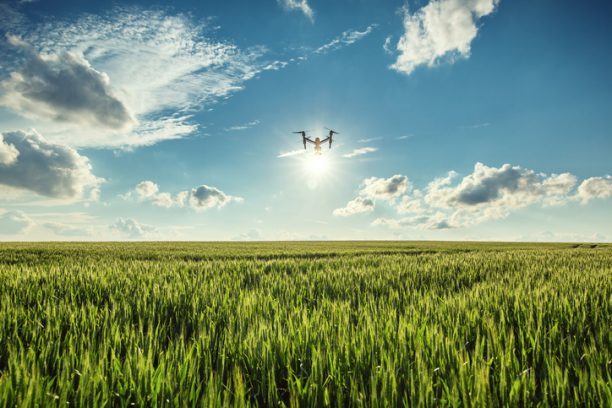The panel, moderated by Intel‘s Anil Nanduri, was a small group of heavy hitters. Michael Ritter of Slantrange, Dyan Gibbens of Trumbull Unmanned and Dr. Christophe Strecha of Pix4D focused on how to integrate aerial data throughout the enterprise. “If you’re in the industry, you’ll likely work at some point with someone on this panel,” said Gibbens, pointing out that the group represented areas across the workflow: from data capture to processing and analysis.
Nanduri began by asking the panel if they had seen proof of concept projects with aerial data become recurring ways of doing business for their enterprise customers. Gibbens, whose clients are primarily in the energy industry, commented that lower oil prices had forces efficiencies in that vertical – which had led to the adoption of drone mapping projects. Dr. Strecha of Pix4D said that their company had seen widespread adoption in areas where drones have a significant benefit, such as mining where drones can travel in inhospitable environments. And Ritter, whose customers are in the agriculture sector, said that drones had revolutionized the way that crops are evaluated – “We’ve seen an evolution of these concepts being adopted,” said Ritter. “Some parts of the industry are eagerly adopting the technology.
While the panel saw drone technology being broadly adopted across verticals, they agreed that agriculture – a $5 trillion industry – may offer the most potential for the drone industry. Defense, energy, and construction were all named as emerging sectors for drone technology adoption.
The panel agreed that adoption of drone technology differed around the world. Strecha pointed out that the concept of data sharing is different depending upon where you are. “In many parts of Asia, cloud-solutions are just not acceptable,” said Strecha. “And pushing data to a cloud is still really hard in some areas… in the next few years, I think internet connectivity will be OK around the world, but how do you get there now?”
When asked what they saw as the top barriers to entry for enterprise clients, participants said that education, regulations, and data transfer were important. Gibbens commented that their company had to educate clients on technology adoption and safety issues, and added that clients were not interested in small benefits but needed to see an order of magnitude savings.
Technology has outpaced regulations, the panel agreed – but it is up to the drone industry to help. “How can we work with FAA to solve the problems for them?” asked Gibbens.”Where we really want to get to is beyond line of sight,” said Ritter. “That will really transform the industry.”
The group also discussed the need to improve public perception of drones. “Education is very important,” said Strecha. “The value of drones needs to be seen by every person… people don’t see the value.”
“When people see value, they are more accepting of new technology,” said Nanduri. “That’s something we all need to be cognizant of.”
While widespread enterprise adoption hasn’t happened yet, both panel and audience agreed that momentum was gathering.
“If I look at two years back and where we are now, it has gone so fast,” said Nanduri. “There are still things that need to be done.”
“We’re at the cusp of this disruptive innovation,” said Gibbens. “I’m excited to see what comes next.”
Miriam McNabb is the Editor-in-Chief of DRONELIFE and CEO of JobForDrones, a professional drone services marketplace, and a fascinated observer of the emerging drone industry and the regulatory environment for drones. Miriam has penned over 3,000 articles focused on the commercial drone space and is an international speaker and recognized figure in the industry. Miriam has a degree from the University of Chicago and over 20 years of experience in high tech sales and marketing for new technologies.
For drone industry consulting or writing, Email Miriam.
TWITTER:@spaldingbarker
Subscribe to DroneLife here.
